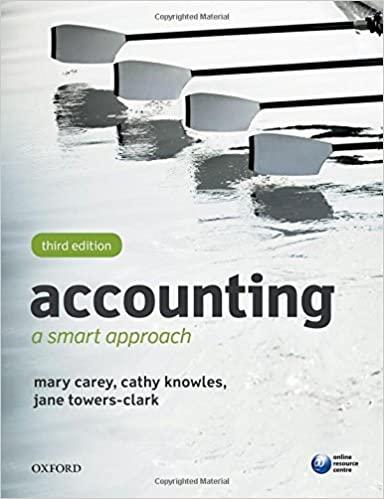Answered step by step
Verified Expert Solution
Question
1 Approved Answer
Hello. I need help with solving on the third picture, Im not sure where the numbers are coming from, for example, 6,000 dollars in thousands.
Hello. I need help with solving on the third picture, Im not sure where the numbers are coming from, for example, 6,000 dollars in thousands. Its already solved, but I need someone to explain step by step on how to solve these, like how did they get those numbers. Thank you. 



That was the only information given.
Salamander Inc. is a food processing company that operates divisions in three major lines of food products: cereals, frozen fish, and candy. On 13 September 20X1, the Board of Directors voted to put the candy division up for sale. The candy division's operating results had been declining for the past several years due to intense competition from large international players such as Nestle and Cadbury The Board hired the consulting firm Atelier LLP to conduct a search for potential buyers. The consulting fee was to be 5% of the value of any sale transaction By 31 December 20x1, Atelier had found a highly interested buyer for the candy division, and serious negotiations were underway. The buyer was a food conglomerate based in Brazil; it offered $5.3 million cash. On 25 February 20X2, after further negotiations, the Salamander's board accepted an enhanced Brazilian offer to buy the division for $5.5 million The Salamander shareholders approved the sale on 5 March 20x2. The transfer of ownership took place on 31 March 20X2 Salamander's income tax rate is 20%. Other information is as follows (before tax, in thousands of dollars) 31 December 13 September 20X1 20X1 Book Value Fair Value Fair Value Candy division's net assets: Current assets Property, plant, and equipment (net) Current liabilities $ 970 $ 900 5.200 3,700 (1300 (1300) $ 4,870 $ 3,300 $ 820 3.900 (1.300 $ 3,420 Net earnings (loss) of the candy division 13 September to 31 December 20X1 1 January to 31 March 20X2 530 (640) Required: 1. Prepare whatever journal entries are appropriate at 13 September 20X1, 31 December 20X1, 25 February 20X2,5 March 20X2, and 31 March 20x2. (If no entry is required for a transaction/event, select "No journal entry required" in the first account field. Enter your answers in thousands, not millions or in whole Canadian dollar.) Required: 1. Prepare whatever journal entries are appropriate at 13 September 20X1, 31 December 20X1, 25 February 20X2,5 March 20X2, and 31 March 20X2. (if no entry is required for a transaction/event, select "No journal entry required in the first account field. Enter your answers in thousands, not millions or in whole Canadian dollar.) Debit General Journal No Credit Date 13 September 20X1 1 1,800 360 Impairment loss Income tax recoverable Current assets-candy division Property, plant and equipment candy division Income tax expense 115 1,685 360 1,300 2 13 September 20X1 4,370 855 Current liabilities-candy division Assets of discontinued operation held for sale Current assets candy division Property, plant and equipment candy division Liabilities of discontinued operation held for sale 3,515 1,300 114 3 31 December 20X1 23 Assets of discontinued operation held for sale Income tax expense Impairment loss Income tax payable 114 23 4 25 February 20X2 No journal entry required 5 5 March 20X2 No journal entry required 1,300 5,500 408 6 31 March 20X2 Liabilities held for sale Cash/Receivable Income tax expense Payable to consultant Gain on disposal of discontinued operation Assets of discontinued operation held for sale Income tax payable 275 2,041 4,484 408 2. Assume that the after-tax earnings from continuing operations amounted to $6 million in 20X1. Prepare the lower section of the earnings section of the 20X1 SCI (Enter your answers in thousands, not millions or in whole Canadian dollar.). 6,000 SALAMANDER INC. Statement of Comprehensive Income (partial) Year endod 31 December 20X1 (in thousands of Canadian dollars) Net income from continuing operations, after tax $ Gain (Loss) from discontinued operations: Operating profit Impairment of net assets Earnings (loss) from discontinued operations $ Net income 424 (1.349) (925) 5,075 Step by Step Solution
There are 3 Steps involved in it
Step: 1

Get Instant Access to Expert-Tailored Solutions
See step-by-step solutions with expert insights and AI powered tools for academic success
Step: 2

Step: 3

Ace Your Homework with AI
Get the answers you need in no time with our AI-driven, step-by-step assistance
Get Started


